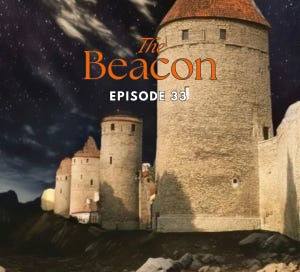Three days of hard marching north and east had brought the Margonni army’s vanguard within sight of the Highwater River, rushing west through steep banks by Blayne’s southern wall. The narrow, hilly tongue of land between the Highwater and the Lost Wagon River to the south sat higher than the vast rolling plain beyond the Angeva Road, hinting at the rocky bones lying under its thick, fertile soil. Extending eastward, those bones eventually rose into the Wolf Hills before reaching skyward as a spur of the Dragon’s Teeth Mountains.
Alone on the crest of a ridge, King Lorens sat astride Ranger, peering northward at a bridge that spanned the Highwater a few miles east of Blayne. Despite his distance from it, he could see well enough that a force of several hundred—perhaps a thousand—Leitani had encamped on the far side, their distinctive conical dwellings dotting the grassy landscape on both sides of the road to the town. The ridge’s height also afforded him the sight of many hundreds more Leitan tents clumped thickly for a furlong outside Blayne’s main gate.
So, the ten thousand warriors have arrived, the king said to himself. They don’t appear to be well-led. I, at least, would have camped near water, and my sergeants would have laid out an ordered camp.
Behind him, his own camp was forming as each company shuffled to its assigned areas, and the men began erecting tents, clearing circles for cook fires, and digging temporary latrines. On the ride up, Lorens had noted that the ridge’s backside featured a few rills winding down toward larger streams that eventually emptied into the Lost Wagon River. Despite the full water barrels the company wagons hauled, he knew his thirsty soldiers and horses would likely drink the streams dry before they moved on. The streams would recover quickly, but the scars of their one-night camp would be visible for years. War is tough on the land, he thought. At least they won’t be the scars of a battlefield.
He gazed westward over the wind-stirred, dry grass stalks, but he could not see as far as the White River. The relief troops should have reached the Blayne garrison’s fortress, and if all went according to plan, more soldiers from western and southern garrisons and the ducal levies from Mortimor and Forsettis marched that way. The nearer eastern dukes of Bardonnel and Leona had also pledged men, which he hoped would arrive the next day.
Inspecting the lay of the land one last time, he turned Ranger’s head and left the top of the ridge. His aides, the marshals, and their aides huddled together just below the ridgeline where the king had told them to remain while he scouted the enemy’s position alone. Eager faces turned toward him as he picked his way toward them.
“Gentlemen,” he said, coming to a stop, “the enemy appears ignorant of our presence for now, and I would like to keep them ignorant for as long as possible. They will likely see the smoke of our fires soon enough and guess who we are. Even so, I want a picket line formed just below the ridge so that no one exposes himself against the sky and gives us away. Get the word out that no one must mount the ridge for any reason.”
Marshall Mortimor coughed, then spoke. “Lord, I assume what you saw gave you an idea about how to prosecute this engagement. I also assume its success hinges on this subterfuge.”
“Indeed, Mortimor!” the king said, excitement creeping into his voice. “The geography of this land will aid us if we use care tonight. If the enemy cannot see us, they cannot number us. Unless they climb the ridge, they cannot see our movements behind it. If their scouts do not return with their reports, their leadership cannot be sure of anything about us. We must be prudent and tricky. Tactical deceit wins more battles than heroic acts.”
“Do you wish to order cold rations tonight, lord?” the always practical Marshal Telsiora asked.
“Yes, do so,” Lorens said, nodding. “Minimal fires—only for what is absolutely necessary. I’m sure it will be a warm night.” He observed the valley beneath him filling up with soldiers and their long trains of supplies. “Go back to your divisions and spread the word. Get something to eat and come to my tent in two hours. I will tell you then what I aim to do.”
The Jester is a clean YA fantasy novella about a young man with many interests and skills who yearns to discover what he does best. First, however, he must figure out who stole the king’s dagger, and along the way, he experiences adventure, entertainment, and perhaps a wee bit of romance! Click here for the first episode!
The king’s tent, which everyone else called the King’s Pavilion, stood twenty feet to a side and was strewn inside with thick carpets. A pair of tapestries of King Margonne's exploits with Qadira partitioned off its rear third as the king’s sleeping chamber, which contained another layer of rugs and a four-inch, thickly stuffed mattress for the king’s comfort. Along with a couple of chairs, the outer chamber featured an ingenious and remarkably sturdy foldable table with hinged legs for quick setup and takedown. On it lay several maps, which Lorens, having changed into a fashionable red silk shirt and deep blue pants tucked into high black leather boots, was poring over as the marshals and their senior aides drifted in.
Turning to his aide-de-camp, a young captain named Dunston Haviland, he said, “Tie back the flaps, will you, captain? We will need both the light and the breeze this evening, I warrant.” Haviland sprang to fulfill the king’s request.
“I see we are all assembled,” Lorens said in his rich voice, addressing the marshals. He grinned. “I hope you all enjoyed your cold meat, cheese, and fruit dinner! The captain will serve us wine in tin cups and make some kind of sweet bread available. I never know what the staff packs in those wagons! I would eat the common soldier’s fare, but the palace steward overrules me every time!”
The statement drew a few chuckles, especially since all knew the palace steward, who, while an excellent administrator, was an obsequious old man who nearly wept every time the king frowned. The assembled officers also guessed that the king’s butler, the masterly Edgar, had likely assembled and packed Lorens’ mobile larder.
Once everyone had wine in their cups, the king began. “I draw your attention to this map,” he said, waving to the one closest to him. “The cartographer has been so kind to draw in this ridge and others as they extend from the hills to our east. They do nothing but climb higher all the way to the Dragon’s Teeth, which is good for us. But we need not go so far! Our goal is this humble feature here.” He stabbed the line of the Highwater River about ten miles east of Blayne.
“What do those dots indicate?” Marshal Vash asked, squinting. “A ford over the river?”
“Precisely!” the king boomed, his smile broad. “Before this new bridge over the Highwater was built, all traffic to the south had to go far out of its way, either over the northern bridge on the White River near our garrison or down the East Road to this ford and then back to our position here. It was very inefficient.”
“The Leitani in Blayne surely know about this ford,” Marshal Mortimor objected. “They will be watching it.”
“I’m sure they will!” the king answered confidently. “But I am betting they will not have a large force there, expecting us to be as direct as they are. Even if they post a thousand warriors there, we will overwhelm them. I intend to take five thousand over that ford and strike from a direction they are not expecting us to come from.”
One hand gripping his chin between thumb and forefinger, Marshal Telsiora cleared his throat. “Sire, you said five thousand men would accompany you. What of the remaining thousand?”
“Perceptive as always, my good Paydon!” the king bellowed, a twinkle in his eye. “Those thousand soldiers will stay here with you. You will choose four hundred infantry, an equal number of archers, and one hundred light horse. Your force is a distraction to keep the Leitani’s eyes on you. I want them to think that you are a small advance force come to see how things stand here. You can test the bridge if you like to see their reaction, but pull back once you know what they’ll do. Hurl some rocks and fireballs over Blayne’s wall—we’ll leave the catapults here. Make a show of everything you do. Oh, and always retire here, beyond the ridge, so they believe our main force is hiding here. Show no mercy to all scouts and raiding parties. I want no word to get back to the leadership in Blayne.”
Telsiora nodded. “I see one potential flaw. What if they attack in force across the bridge?”
Frowning, Lorens thought for a moment before saying, “I doubt they will, but if they do, fall back in an orderly fashion across the Lost Wagon River and hold the bridge. Destroy it if they are about to overwhelm you. But it is my hope that the Leitani will see us five thousand coming and call all troops to meet us, the larger threat. If they do that, secure the Highwater Bridge and form up to hit them in the rear.”
“When do we leave?” Vash asked, always ready for a scrap.
“First light,” the king said immediately. “Paydon, stay hidden until mid-afternoon tomorrow, then cross the ridge with, say, a quarter of your force and pretend to inspect their position. Use a glass. You will be trying to make it look like you have just arrived. Then, after a reasonable time, return to camp. I don’t want them to think we’ve had time to do anything tricky, since we have just arrived on the scene, haven’t we?” He smirked.
“We will cross the Highwater ford at dawn on Skyday,” he added, “and move west immediately. Make your feint on the bridge then. Don’t overextend yourself.”
“Yes, lord,” Marshal Telsiora said with a slight bow.
Lorens rubbed his hands together, his lips curling in a wolfish grin. “The Shepherd willing, we will crush this rebellion in one decisive blow.”
A note:
The Leitan army’s situation at Blayne was untenable, and any experienced commander would have told them so: The Leitani needed to get behind Blayne’s walls and organize and drill their warriors. However, it had few trained soldiers and no professional officers higher than the rank of sergeant. Its officers were newly minted “chiefs” who claimed descent from ancient Leitan chieftains before Margonne’s conquest. The “war leader” was one of Baktron Nehkesh’s sons, Kitron, an untried agitator of twenty-five who had never led more than a few dozen toughs on the streets of Kingsport. Moreover, the general mood of the camp reflected their imagined invincibility, granted by Azuri, against the Margonni thieves of their homeland. Reliance on a demon-god and sheer numbers is no battle plan.
If you've enjoyed reading this on Substack, please consider buying me a cup of coffee!











Sounds like a good plan of attack.